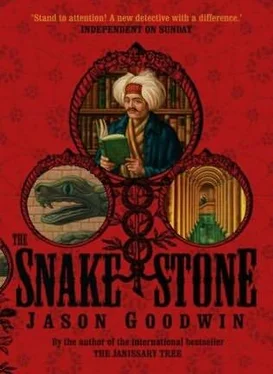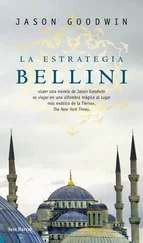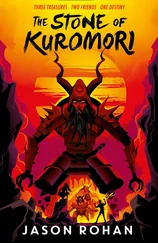Jason Goodwin - The snake stone
Здесь есть возможность читать онлайн «Jason Goodwin - The snake stone» весь текст электронной книги совершенно бесплатно (целиком полную версию без сокращений). В некоторых случаях можно слушать аудио, скачать через торрент в формате fb2 и присутствует краткое содержание. Жанр: Исторический детектив, на английском языке. Описание произведения, (предисловие) а так же отзывы посетителей доступны на портале библиотеки ЛибКат.
- Название:The snake stone
- Автор:
- Жанр:
- Год:неизвестен
- ISBN:нет данных
- Рейтинг книги:4 / 5. Голосов: 1
-
Избранное:Добавить в избранное
- Отзывы:
-
Ваша оценка:
- 80
- 1
- 2
- 3
- 4
- 5
The snake stone: краткое содержание, описание и аннотация
Предлагаем к чтению аннотацию, описание, краткое содержание или предисловие (зависит от того, что написал сам автор книги «The snake stone»). Если вы не нашли необходимую информацию о книге — напишите в комментариях, мы постараемся отыскать её.
The snake stone — читать онлайн бесплатно полную книгу (весь текст) целиком
Ниже представлен текст книги, разбитый по страницам. Система сохранения места последней прочитанной страницы, позволяет с удобством читать онлайн бесплатно книгу «The snake stone», без необходимости каждый раз заново искать на чём Вы остановились. Поставьте закладку, и сможете в любой момент перейти на страницу, на которой закончили чтение.
Интервал:
Закладка:
Yashim inclined his head politely.
“Indeed,” Grigor continued, “before the Turkish Conquest we had a saying: better the sultan’s turban than the bishop’s miter. Anything but the pope in Rome. You Turks are merely the caretakers of our Constantinople.”
He leaned forward, his long beard brushing against the top of his desk. “It is Greek because its people are Greek. Because it is the scene of our triumphs-and all our trials, too.”
He jabbed the air with a plump finger.
“In this city the Greek faithful have experienced their deepest humiliations. The loss of western Christendom-Rome, Ravenna, all that-ended with the Great Schism with the pope, right here in the church of the Holy Wisdom, Aya Sofia. Then came the sack of the city by the crusaders, in 1204: for sixty years we endured the rule of heretics. The fall of the city in 1453, and the death of the emperor at its walls. Quite a catalog. We have suffered the loss of our churches, the rages of the mobs, the murder of our Patriarch-ah, yes, we have bought this city with our blood, and we survive. Constantinople is-I say it without blasphemy-our Golgotha.”
He held up his hands, fingers outspread. “Now, perhaps, you understand what I mean.”
Yashim sat very still. He was impressed.
But he had come for something else.
“Tell me about the Hetira, Grigor.”
A shadow slid across the archimandrite’s face. “I don’t know who they are: a many-headed Hydra, possibly. They have nothing to do with us here-but yes, their aims have a certain currency in some circles of the church. And beyond that, in the kingdom of Greece.”
A low bell sounded from far away. Grigor got to his feet and opened a cupboard. Inside hung his vestments.
“I officiate at mass,” he explained.
“I think they frighten people, Grigor,” Yashim said.
Grigor put his arms through his robes, one by one, and said nothing. He did not look around.
“I think there is something they kill to possess,” Yashim continued. “Or to protect. Some-I don’t know-some object, or some kind of knowledge. I think that when anyone gets too close, they react.”
“I see.” There was a look of scorn on Grigor’s face. “And you, angel, are you not afraid for yourself?”
“I am afraid only of my ignorance,” Yashim replied carefully. “I am afraid of the enemy I don’t know.”
The priest reached carelessly for a book on the shelf beside him.
“Your enemy is an idea. Greeks call it the Great Idea. For the time it takes to say a mass, you may look at this. After that, the book does not exist.” He laid the cope across his shoulders and turned to Yashim. “The church has no part in this affair of yours.”
They stared at each other, the eunuch and the priest. Then Grigor was gone, and Yashim was left alone, clutching the book in both hands.
32
For the time it takes to say a mass. Yashim sat down. The book was written-assembled was a better word-by a Dr. Stephanitzes, late physician-in-ordinary to the Greek army of independence. It had been recently published in Athens, the capital of independent Greece. The paper was cheap; the gold-blocked title on the cover was blurred around the edges.
Yashim had never come across such a book before-a wild flinging together of prophecy, prejudice, false premise, and circular argument. It preached a story that began with the collapse of Byzantine power in 1453 and wound its way, over hundreds of pages and many false starts and irrelevant asides, to its eventual restoration under its last emperor, miraculously reborn.
Yashim discovered the oracles of an ancient patriarch, Tarasios, and of Leo the Wise; the prognostications of Methodios of Patara; the curiously prophetic epitaph on the tomb of Constantine the Great, who had founded the city fifteen hundred years before; all of them twisted and sugared up by the visions of one Agathangelos, who foresaw the city liberated by a great phalanx of blond northern giants, while the Turks themselves were to be chased away beyond the Red Apple Tree.
This, then, was the Great Idea. A farrago of blasphemies and wishful thinking-but heady stuff, Yashim had to admit. Like sticking your nose through the gateway to the Spice Bazaar. If you were a Greek, and you wanted to believe, then here was the sacred text, without a doubt.
33
In the church of St. George, the archimandrite waved the censer again and filled the air with the grateful fragrance of sandalwood and frankincense. He intoned the words of the creed.
I believe in One God, Father Almighty, Maker of heaven and earth and of everything visible and invisible, he sang.
And in One Lord, Jesus Christ, the only-begotten Son of God, begotten of the Father before all ages.
Light of Light, True God of True God, begotten, not made, consubstantial with the Father, through Whom all things were made.
He sang the words; his body trembled to the majestic statement of faith; but his mind was elsewhere. Had he, he wondered, already said too much?
I acknowledge one baptism for the forgiveness of sins.
And then there was the book. The Ottoman authorities probably didn’t know that it existed. It was better that way.
I await the resurrection of the dead.
And the life of the ages to come.
That was the way it should be kept.
Amen.
34
Yashim made his way into the Grand Bazaar. It was two days since Goulandris the bookseller had been killed, and still confidence had not returned: locked doors punctuated the frothy rows of booths, the vendors seemed subdued, the crowd less busy than usual.
Malakian was at his doorway, sitting quietly on a mat with his hands in his lap.
“Do you have news?”
Yashim inclined his head. “Lefevre, the Frenchman we talked about? He was killed in Pera.”
Malakian sighed. “It is like I said. Lefevre lived a dangerous life.”
“That’s not quite what you said, Malakian efendi. You said he did not always dig with a spade.”
“It is the same, my friend. In Istanbul, I think, it is better that the ground is not disturbed.”
“Lefevre disturbed something.” Yashim squatted down beside the old man. “Or someone.”
“You will have a coffee with me,” Malakian said.
Yashim could tell he didn’t mean it. He declined. “The Hetira, efendi.”
The old Armenian paused before replying. “I think a man like Lefevre would work where money is to be found. But sometimes in these places there are too many secrets, also, and so there is no trust. A negotiation is not easy. I am sorry for his children.”
“His children?” Yashim found it hard to imagine a Lefevre with children. But then, what would he know? “Do you have children, Malakian efendi?”
The old man nodded solemnly. “Five,” he said.
“God’s blessing upon them,” Yashim said politely. “Malakian efendi, do you still have that coin for Dr. Millingen? The English collector?”
It was Malakian who looked surprised. “Of course. He does not come here every day.”
“I will be in Pera this afternoon,” Yashim said. “I could take him the coin, if you liked.”
Malakian turned his head to look at Yashim. “You want to meet Dr. Millingen?”
“Yes,” Yashim said.
35
“My French is-indifferent, I’m afraid,” said Millingen. He laughed pleasantly and held out a hand. Yashim took it: the doctor had a firm grip. Scarcely older than Yashim, he looked in good shape: the grizzled hair, the lean, brown face, the tall, erect posture. He was neatly dressed in a black cutaway coat and a brilliant white shirt; his cravat was loose at the neck.
“Most kind of you to come. Aram’s been throwing out hints these past few weeks, and my collector’s instinct tells me what you’ve brought. You aren’t an addict, too?”
Читать дальшеИнтервал:
Закладка:
Похожие книги на «The snake stone»
Представляем Вашему вниманию похожие книги на «The snake stone» списком для выбора. Мы отобрали схожую по названию и смыслу литературу в надежде предоставить читателям больше вариантов отыскать новые, интересные, ещё непрочитанные произведения.
Обсуждение, отзывы о книге «The snake stone» и просто собственные мнения читателей. Оставьте ваши комментарии, напишите, что Вы думаете о произведении, его смысле или главных героях. Укажите что конкретно понравилось, а что нет, и почему Вы так считаете.












